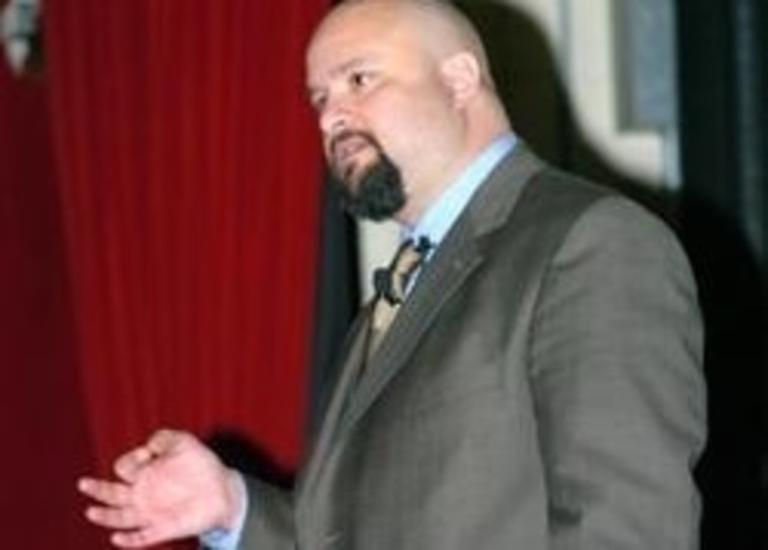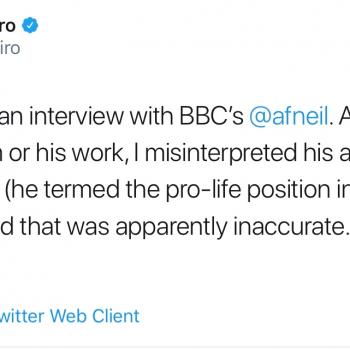
Calvinists with some time to kill, and a basement, can wreak strange havoc on ordered society. Oft it is hard to know whether they do this by design or by tic; whether they need to be arrested for delinquency, or put on L-DOPA. I have my opinion, but you must be left to decide for yourself, dear reader.
A couple of caveats will be in order from the outset. The reason they will be in order is because they will be ignored, or denied, even after I’ve given them. These next few paragraphs may even be skipped over altogether, as though they were written in a strange and antique language not yet deciphered by even the best cryptographers. Having them on the record, for those who hath eyes to read, will give me the opportunity, should the time come, to point out folly that has no excuse. (If it had not happened before—I call to witness exhibits A, B, and C—I would not be saying it now.)
First, it is not my intention in this post to defend Ergun Caner against every accusation of lying that has been made against him. I address myself only to one particular accusation—specifically, here and here—by TurretinFan. (TF, by virtue of his anonymity, and his bold persistence in odd arguments, is known on this blog as the Amazing and Undaunted Mr. X of Calvinism.)
An analogy may help. The one time I had jury duty, the accused stood trial for drug possession and resisting arrest. We found him guilty of resisting arrest and not guilty of drug possession. Afterward, the judge informed we of the jury that, during the trial, he had cautioned the prosecuting attorney that she was not to mention that the accused had prior convictions for drug possession. To do so would have biased us against him; and we were to consider only the merits or demerits of the charge before us. We were passing no judgment against other actions the accused may or may not have committed.
Second, I would hope that the reader will recognize the allusion in my title, and that it is intended only for the joke of calling that earlier title to mind in context with the accusations against Ergun Caner, as well as the loose propensity some people have of throwing the word “lie” around when all that is really involved is a different interpretation of the facts. I do not myself make an accusation of lying against anyone. I accuse my opponents only of being fools—the kind described in Prov. 26:11 and 2 Pet. 2:22. Whatever else they are or aren’t is their own business.
In this article, I want to look at some of the tactics that are frequently employed by Internet Calvinists. In some cases, as in the first, those tactics are subtle and seemingly erudite, but involve a great deal of sleight-of-hand. In other cases, as in the second, the mask is off and the tactics take the form of sudden Twitter rant and violently shoving words into someone else’s mouth. Both deserve to be exposed—with reason but with firmness, calling truth by truth’s name.
WORDS ARE MADE TO BEND
When one takes the time to examine Mr. X’s accusation of dishonesty on the part of Dr. Caner—specifically, that he lied about the number of debates he has engaged in—one quickly finds that, at the heart of the accusation, rests a question of definitions. As quoted by Mr. X himself, in his article at Alpha & Omega Sophistries, here is Dr. Norman Geisler’s defense of Dr. Caner. Read and note.
The Charge that Caner Falsely Claims that he has had more than Sixty Debates with Muslims.—Critics challenge this statement and claim it is an intentional embellishment. But they mistakenly assume that all debates are formal. Caner lists many formal debates in the last ten years or so. But he has also engaged in multiple informal debates as well. There is no evidence to deny his claim. Indeed, given his numerous encounters with Muslims, it is reasonable to assume there were at least sixty.
Now, is this only Dr. Geisler’s claim after the fact—a cover story quickly devised once Dr. Caner’s disingenuousness had been exposed before the very eye of astonished mankind? Hardly. For as long ago as 2010, in the article on his own Web site, Mr. X quotes Dr. Caner himself, thus:
I will get e-mails … through the website and they will say, “Where are your debates?” And my debates are all here, they’re all free. And here are some of the rules that go with it. Even though I’ve done ’em for 20 years, I don’t believe debate is only formal. As a matter of fact, I believe you are severely limiting yourself if the only exposure you have to other world religions is through formal debate. I believe the most effective means of sharing the truth of Jesus Christ the exclusive nature of salvation through Christ can only be found through conversation. … I became dissatisfied with formal debate and quite frankly disgusted with some of the practitioners in that passive-aggressive methods of shaking their head and making noises, embarrassing themselves by acting petulant. And so, like I said, about five, six years ago, I became convinced that there had to be another way. What we’ve done is we’ve established 3D, which stands for debate, dialog, and discussion, where [Now, pay attention here to what Dr. Caner describes as an example of “debate” under this definition.] we sit around the table and I interview, for instance in this first season a Unitarian Universalist, a Druid, etc. and it’s free form. I even tell them ahead of time, “I will never provoke you. I cannot ask you trick questions and this isn’t the Jerry Springer show. In other words there’s not going to be a moment where you have to lurch out of your chair to defend yourself.
Now, what I have next to me—on my very desk, dear reader—is a copy of the American Heritage Dictionary (paperback edition of 2004). I took care to consult this valuable resource, to see whether Dr. Caner and Dr. Geisler had been playing fast-and-loose with the word “debate.” And what I discovered was that the definition supplied by those two worthy scholars was—wait for it—the very same! as definition #2. In AHD’s own words, to debate is (take notes, Mr. X) “to discuss opposing points.” In fact, he who consults the AHD will have to continue all the way to the very last definition to find Mr. X’s exclusive, singular understanding of the word: “A formal contest of argumentation in which two opposing teams defend and attack a given proposition.” So there you are, dear reader. Far from Dr. Caner and Dr. Geisler playing fast-and-loose with the word, Mr. X is playing slow-and-tight. For Mr. X, it is as though the word “debate” is a strait gate and a narrow way.
Observe how Mr. X insists on treating his one among several possible usages as though it were normative:
This discussion helps to highlight that Dr. Caner is aware of the fact that these interviews are not formal debates. While he might like to call them “3D,” he seems to be aware that there is no “debating” going on in the conventional sense of the term.
Now, I checked, and rechecked, and rechecked again, and checked a fourth time for good measure; and I invite you to check any dictionary of your choosing. I find nothing which would lead me to conclude that Mr. X’s definition is “conventional” while the others are “unconventional.” There is nothing in the dictionary to indicate that those who use the word in this sense are using it in the normal sense, whereas those who use it in that sense are devious obscurantists who have to be watched with a close eye by the blogging community and apologetics police. It would seem, from a glance at the dictionary, that Mr. X’s definition is but one among equals.
Howbeit, Mr. X goeth on to ’plain that the debates Dr. Caner listed on iTunes(R) were not “formal.” He remains undaunted by the fact that he has just quoted Dr. Caner as saying that he never meant formal debates in the first place. If in King Lear Lear hath cause to ’plain, in the blogosophere Mr. X hath wont to ’plain. Saith Mr. X:
From what I could tell, in every case the format was roughly the same: the visitor was interviewed with a series of questions designed to learn more about the religion. Sometimes the questions are pointed questions. Sometimes there are questions back to Dr. Caner. However, the interviews appear to be mostly designed to inform the students about the religious group whose representative was interviewed.
Isn’t that the very way Dr. Caner described them in the first place? He said: “[W]e sit around the table and I interview, for instance in this first season a Unitarian Universalist, a Druid, etc. and it’s free form.” Where’s the inconsistency?
There doesn’t seem to be any argument, which would seem to be a necessary component of debate.
In other words, Mr. X has spilled a lot of virtual ink in order to prove that the debates Dr. Caner lists were debates in the sense that Dr. Caner says he uses the word. How deceitful! What Dr. Caner should have done is to say, “I don’t believe debate is only formal,” and then gone on to list only formal debates and include only formal debates among his total numbers.
But in fact, what Mr. X has done in his post is to (1) quote Dr. Caner to the effect that he uses the word “debate” under sense a; (2) note that the debates Dr. Caner has done are consistent with sense a; (3) claim, without any warrant from the dictionary, that sense b is the “conventional” sense of the word “debate”; (4) accuse Dr. Caner of duplicity for not having done the kind of debates that he never claimed to have done in the first place.
That, dear reader, is called sleight-of-hand.
TWISTED TRUTH AND HALF THE NEWS
Of course, the astute reader might be asking at this point, What does it matter how many debates Dr. Caner has done, or what kind? For essentially this is a dispute over usages of words. Why doesn’t Mr. X accuse the dictionary people of lying? Why all this pitch and moment to accuse Dr. Caner of every evil that men do under the sun because he remains consistent with the dictionary?
That is an apt question. I asked it myself; and I asked it in that very venue for all right reason, Twitter. (Those who have been reading my latest blog posts will know my opinion of the state of rational discourse on Twitter.)
Triviality central: Does the fate of mankind depend on how many debates @erguncaner has done? http://t.co/v43goNPZvP
— Scott Eric Alt (@ScottEricAlt) September 19, 2013
That was on September 19. A full six days later, on September 25, someone by the name of J.D. Hall, who runs this Web site and describes himself in his Twitter profile as a “planter,” interjected himself. Now I don’t know anything about Mr. J.D. Hall, “planter,” beyond the exchange that he and I had on Twitter. Apart from our exchange, he might be the gentlest soul this side of Purgatory. Perhaps he is straight-faced and rational except when the subject turns to Ergun Caner or Catholicism, at which point he is beset by seizures like Kramer suffered whenever he heard Mary Hart’s voice. Perhaps these subjects are his full moon. I don’t know; all I know, and all I can judge by, is our exchange on Twitter. It began thus:
@scottericalt You call habitually lying “trivial.” Shame on you. #DOWNGRADE Preaching repentance requires…repentance.
— JD Hall (@PulpitAndPen) September 25, 2013>/a>
Notwithstanding this little imprecatory psalm, can anyone please tell me where in my original tweet I mentioned lying? Point the word out to me if you can. I don’t find it. And since I don’t find it—and you won’t either, look as hard as you will, but don’t waste too much of your day—I can only conclude that Mr. J.D. Hall, “planter,” is planting words in my mouth. I notified him of such.
@PulpitAndPen No I did not. I said how many debates erguncaner has done is a trivial subject. Sorry to disappoint you.
— Scott Eric Alt (@ScottEricAlt) September 25, 2013>/a>
Thus having been set aright as to my meaning, the uncorrectable Mr. J.D. Hall, “planter,” proceeded to accuse me—oh, the irony—of having poor reading comprehension skills.
@scottericalt Is that the point of Dr.White’s article you linked, number of debates? Or the number of LIES? #readingcomprehension
— JD Hall (@PulpitAndPen) September 25, 2013>/a>
I actually do know a little bit about “reading comprehension,” and would set my scores, on the most advanced test known to man, against his on any day at all. Thus let me school Mr. J.D. Hall, “planter,” on a key point that seems to have sailed over his head into an ether unreachable by him: The fact that “Ergun Caner’s lies” is TurretinFan’s point (not Dr.* White’s; Mr. J.D. Hall, “planter,” couldn’t even get the author right, and he’s lecturing me about reading comprehension) does not mean that it needs to be mine. I can look at a piece of writing and derive my own points and conclusions, which need not necessarily be the author’s. That is what is known as interacting with the text, and constitutes a very sophisticated form of active reading.
Undaunted as Mr. X, Mr. J.D. Hall, “planter,” was not done.
@scottericalt the substance was not about erguncaner‘s # of debates, but his lies about the # of debates. You are minimalizing his sin./p>
— JD Hall (@PulpitAndPen) September 25, 2013>/a>
Actually, the word this Man of Letters is looking for is “minimizing.” And the “substance” of Mr. X’s article may have been Dr. Caner’s “lies,” but that was not the substance of my tweet. Mr. J.D. Hall, “planter,” seems intent on confusing the two.
There is a more important point to be made here, though: I can hardly “minimize” a sin I dispute occurred in the first place. Nowhere did I once state that I accepted the premise that Dr. Caner “sinned” when talking about the debates he has done. Mr. J.D. Hall, “planter,” simply assumes it. One hashtag: #readingcomprehension.
But Mr. J.D. Hall, “planter,” was not done, and felt obliged to end with the following Christian volley:
@scottericalt But then again, you think your sin is paid for by a treasury of merit, so defending a heretic kinda makes sense now.>
— JD Hall (@PulpitAndPen) September 25, 2013>/a>
I am lost—perhaps you are too, dear reader—what the fact that I am Catholic has to do with the preceding discussion. My defense of Dr. Caner, such as it was at the moment, had nothing to do with my Catholicism, or with any doctrine of the Church. Dr. Geisler has defended Dr. Caner, but last I checked he’s not Catholic. Neither is Dr. Caner Catholic, to my knowledge. What does it mean to say, in effect, “You only defend Dr. Caner because you’re Catholic and heretics stick together”?
Twitter is not the venue for the reasoned exchange of ideas; if anything, the opposite is the case. That is why I’ve stopped engaging in back-and-forth barbs on Twitter. Emotive folly runs wild, and Internet Calvinism on that pustule of a site is likewise in need of a strong dose of sulfa. But let not your heart be troubled, dear reader. That’s the reason I am here, and why I respond on my blog, where I can reason out a thought and ponder evidence; and not on Twitter, where I am limited to a 150-character one-liner. I think in paragraphs; I consider and I weigh. Here is where I do it.
Update. J.D. Hall, to his credit, has had a change of heart about his approach to Dr. Caner. The article in Christian Post goes on to say that the same can not be said for Dr.* James White. See also this post by Peter Lumpkins.
***
If you like the content on this blog, your generous gift to the author helps to keep it active. I remember all my supporters in my Mass intentions each week.
















